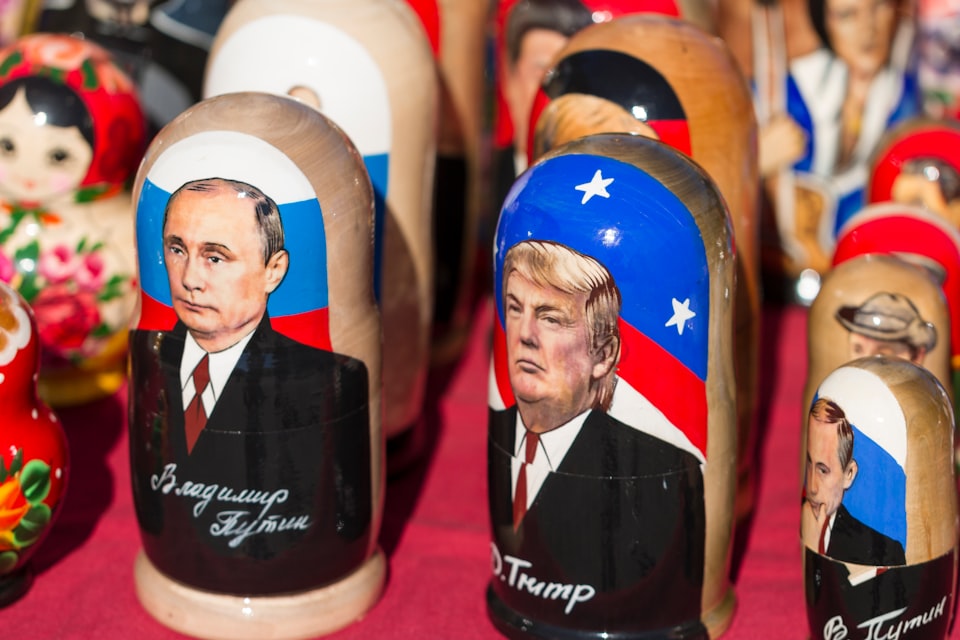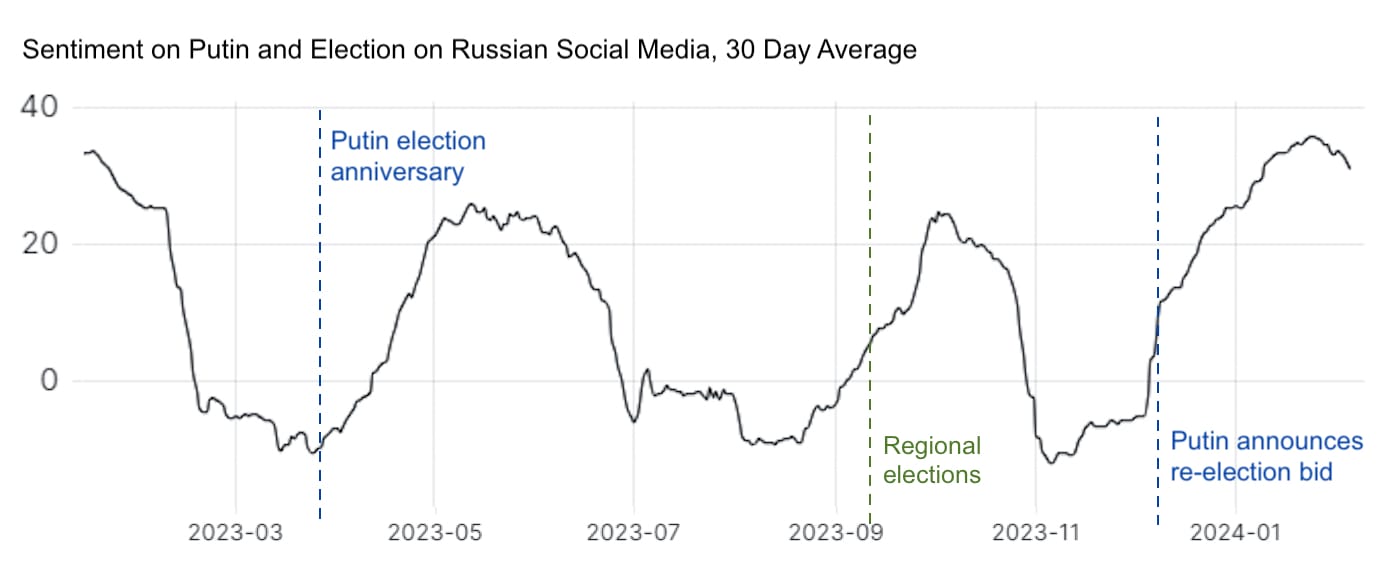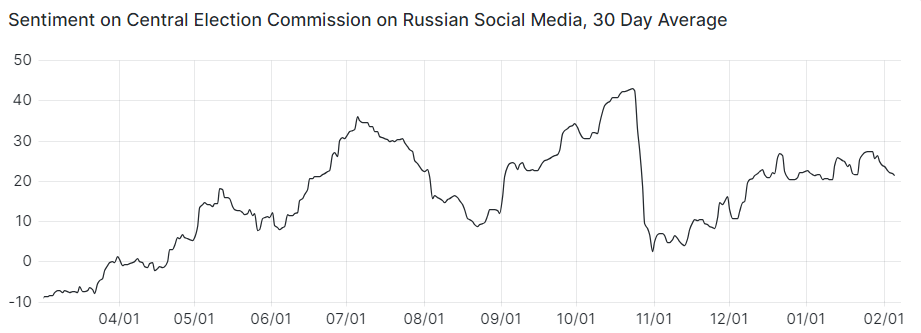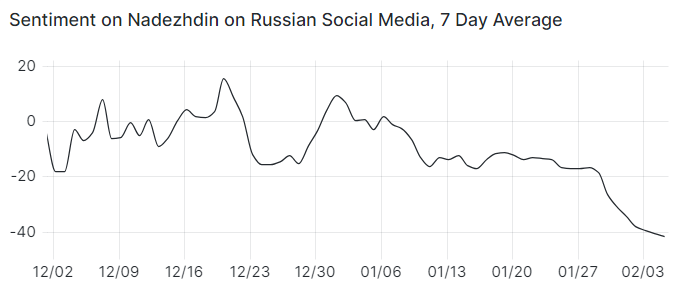What’s going on in the Russian presidential election?

In a little over a month, Russians will have a presidential election. Although the outcome is not seriously in doubt (yes, Putin will win again), it can be hard to get reliable news and polling about the state of public opinion on the subject. The mainstream Russian media more or less takes its orders from the Kremlin, so it can’t be trusted, and social media is so vast and diffuse that it’s hard to know what’s a widely held opinion, and what’s just a few noisy accounts.
FilterLabs.AI has built tools to address these challenges. With a combination of large language models and sentiment analysis, FilterLabs’ technology is able to track both trends in mainstream and independent Russian media and measure attitudinal change on social media and popular forums.
After analyzing tens of millions of articles and posts, FilterLabs has noticed a few significant trends and turning points in recent months.
Putin’s Post-Announcement Bump
Vladimir Putin announced his bid for re-election on December 8, 2023. FilterLabs detected a shift in positive sentiment toward Putin and the elections on both mainstream channels and social media platforms.

A sudden shift in sentiment suggests 1) a major event, and 2) a concerted effort to present the event in a particular way, positively or negatively. FilterLabs’ tools go far beyond searching for keywords. They instead look at the large context and its emotional valence related to the topic.
In the case of Putin’s election announcement, FilterLabs saw a sudden change in attitudes in discourse mentioning Putin and the election. This is to be expected in Russian mainstream media, which is extremely friendly to the Kremlin. A sudden shift in social media, however, suggests that there might be an organized, multi-platform effort to present the announcement in a positive light.
FilterLabs has been zeroing in on these attitudinal changes to find out what’s behind them. Putin’s announcement was followed quickly by a chorus of gubernatorial legislators congratulating him on his decision to run again.
Putin’s Long-Term Pitch
Putin obviously has been planning to run again for some time. In fact, by looking at previous upswings in pro-Putin sentiment, we can see him preparing his general election strategy. For example, attitudes related to Putin and the elections go up on social media from late March through April of 2023, well before his announcement.
When we took a closer look at articles over the year leading up to Putin’s announcement, two main themes emerged.

First, many of the positive posts beginning in late March were celebrating the 23rd anniversary of Putin’s first election. A large number of these posts express the same idea, often in strikingly similar or even identical phrasing: Putin has always been the president who listened to the will of the citizens. This level of similarity across posts often indicates a concerted propaganda campaign.
And given the negativity surrounding the government and elections in the previous month, one can see why the Kremlin might have felt a positivity campaign was needed. February had seen a strong negative reaction to legislation announced by the State Duma (Russia’s legislature) to end publication of government officials’ asset declarations. The legislation is very unpopular because asset declarations were the only real avenue for holding Russian officials accountable for corruption.
Second, many posts throughout 2023 and especially leading up to the September regional elections praise Putin for national infrastructure projects, which began in 2021 across all federal zones. Russian construction revenue is back to pre-invasion levels, no small achievement given the fact that he is dealing with lingering supply chain bottlenecks and sanctions.
Many others feature the fact that Putin and his party, United Russia, have been handing out awards to regional politicians, providing funding for regional projects, and staging patriotic festivals around the country. The general message is that Putin’s presidency has resulted in tangible development, which will make Russians more economically secure in the future.
The war in Ukraine is an inescapable topic, but it represents a conundrum for Putin. On the one hand, it gives him a chance to portray himself as the defender of Russia and its people. On the other hand, bringing it up also reminds Russians that their fathers, sons, and brothers are all at risk of being drafted and sent to the front. Better, it would appear, to emphasize patriotism and development. The Russian people voice concerns about topics like mobilization, but the Kremlin seems to be aiming to create an image of a president that isn't tied to the war in Ukraine.
Overall, then, FilterLabs can see the basic pitch that Putin is making to the Russian electorate. Perhaps surprisingly, he is not playing up his role as a wartime leader. Instead, he is emphasizing economic development, across Russia, and his supposed willingness to listen to his constituents.
Anxiety About Election Integrity
In late October, the Russian Central Election Commission announced that voting for the upcoming election could be done electronically. The effect on sentiment in the news and social media was immediate:

Looking more closely, many commentators were expressing anxiety and discontent. Allowing for electronic voting, they said, opened the door for widespread fraud. This suggests the possibility that even if Putin remains popular, Russian voters are well aware that the election could be manipulated.
Given the sharp drop in sentiment in both mainstream and social media sources, it would appear that there is no way to spin such an announcement positively. There are limits to what even an authoritarian regime would try to do.
However, it’s also notable that sentiment fell further on social media than it did in mainstream sources. Kremlin-friendly news was relatively measured, compared to the deeper frustration expressed by Russians online.
Putin’s Opposition Hasn’t Gained Traction
Putin is not running unopposed, but he is not facing a serious challenger. For example, the Central Election Committee has just denied the anti-war candidate Boris Nadezhdin a place on the ballot, claiming he collected too few valid signatures for his candidacy.
Sentiment in stories and posts about Nadezhdin has been tending downward for a month, even before the announcement:

It’s important to note that these negative sentiment scores do not imply that the articles or social media posts were critical of Nadezhdin. Sentiment scores measure the negativity or positivity, and the intensity of the emotion expressed, in discourse about a given topic. They could just as easily be decrying the Central Election Committee’s decision and expressing frustration that Nadezhdin was being shut out.
Also of note: FilterLabs’ analysis suggests a much lower volume of online discussion about Nadezhdin. Besides a spike when he first said he would run and another when the election commission denied his registration request, Nadezhin’s protest candidacy has not garnered a great deal of public attention. This is to be expected from the Kremlin-friendly mainstream TV channels and newspapers, but it is perhaps disappointing that he has not gotten much attention online either.
The outcome of the 2024 Russian presidential election has never been a question. Putin's fiercest opposition has been barred from running, but didn’t seem to be gaining much traction anyway. But examining trends and turning points along the way reveals some interesting insights into both the mindset of everyday Russians and how the Kremlin is choosing to depict the president and the election. Perhaps surprisingly, Putin’s main pitch to his voters has been economic and domestic, rather than geopolitical.
And there is perhaps reason for hope in the fact that large sections of the Russian public recognize that the Central Election Commission is making it easier to tamper with election results. And they don’t seem to like it.
